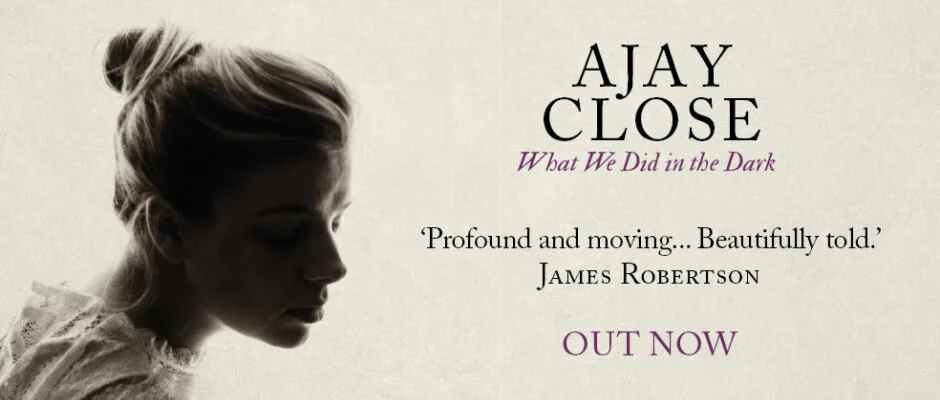I first heard about Ajay Close's new novel, What We Did in the Dark, from the author herself when she came to Anna Burnside's home Salon a couple of years ago. The novel under discussion that night was Ajay's 2017 novel, The Daughter of Lady Macbeth but at the time, Ajay was deep into her research for what became What We Did in the Dark.
After we had discussed The Daughter of Lady Macbeth, Ajay told us the story of Scottish journalist, Catherine Carswell and her tumultuous – and doomed – first marriage to artist Herbert Jackson. I had heard about Carswell and had even read her novel, Open The Door, years ago but it was obvious as Ajay spoke that the story of this doyenne of what was then called The Glasgow Herald was the stuff of fiction. I itched to know more.
I used to read Ajay's pristine features in Scotland on Sunday in awe. Now I read her novels in awe. She was the obvious choice as a guest for the inaugural WiJ Scotland Salon now that Anna's home Salon has flitted to a new home.
Unfortunately Covid-19 has put paid to this Salon. For now. Watch this space for a new date in the autumn. In the meantime, Ajay has written about the writing of What We Did in the Dark for your delectation...
Jan Patience, co-chair Women in Journalism Scotland
Ajay Close on how she wrote What We Did in the Dark
It began with a passing mention in Wikipedia. Catherine Carswell’s first marriage ended in a landmark divorce case. Her husband, Herbert Jackson, spent the rest of his life in a lunatic asylum.
I knew there and then I had the makings of a novel, a fact-based fiction like my suffragette novel A Petrol Scented Spring. It would mean interviewing descendants of the main characters, research in libraries and archives, foreign travel. Almost like being a journalist again (in the good old days), only without deadlines – and with licence to invent what I couldn’t find out.
Carswell was a successful 20th century writer. Three of her six books are Scottish classics. A New Zealand academic has written a critical biography and edited two volumes of her letters. It’s easy to get a sense of her: self-doubting, charismatic, intellectually curious, strikingly goodlooking all her life.
Putting fictional flesh on the bones of an obscure portrait painter like Herbert Jackson was always going to be more of a challenge.
He died in 1929 and was buried in an unmarked grave in Dumfries, but the process of erasing him from the record began much earlier. No one wanted to be reminded of him, not his mother and sister, and certainly not his wife. He can be glimpsed in the distorting mirror of Carswell’s first novel, Open The Door, as the pathologically jealous Mario Rasponi, killed off in a motorbike accident shortly after marrying the author’s alter ego Joanna. There are 12 lines (out of 245 pages!) about Carswell’s first marriage in her autobiography Lying Awake. Neither book tells us much about Herbert.
I knew why. The life-changing Bad Relationship. The one you analyse endlessly – he was this or that kind of nightmare, but how much was I to blame? – until your friends are sick of hearing about it. I have one of those in my past (many women have) and I can’t write coherently about it any more than Cathie could. But I was perfectly placed to tackle her story.
Journalism was a big part of both Herbert’s and Cathie’s lives. In 1905, with a husband in the madhouse and a young child to support, she started working for the Glasgow Herald (the paper I wrote for 90 years later). Herbert’s father, Mason Jackson, was art editor of the Illustrated London News. Thanks to him, several of Herbert’s paintings were reproduced in early 20th century periodicals. This was a massive stroke of luck for me, and not the only one.
Sifting through a bulky folder in Liverpool University Special Collections, I came across a snapshot from 1903. Four art teachers sitting on some steps. One was dark-haired, saturnine, smartly dressed but tough looking, with a broken nose and narrowed stare. Suddenly Cathie’s whirlwind marriage made more sense.
I have a long-dead journalist to thank for my biggest lucky break. Three years after Herbert was taken away to an asylum, Cathie went to court to get the marriage annulled on the grounds that he had been mad on their wedding day. The Times court reporter was a commendably thorough chap. I owe more than half my 300-page novel to his coverage of the three-day case.
Their courtship was romantic but very short. On honeymoon, Cathie found out who she had married. He slept with a pistol under his pillow, convinced his former friends were plotting against him. He believed he was followed by spies and informers, the newspapers defamed him, the American multimillionaire J Pierpont Morgan was his enemy, his food was poisoned… Strangest of all, he was sure he was impotent, despite what he and Cathie were doing night after night. When she told him she was pregnant, he accused her of adultery with the Prince of Wales and tried to strangle her.
You couldn’t make it up! Or rather, I didn’t have to – and, knowing how bizarre the facts were, I really had to raise my game when making up the rest.
What We Did in the Dark is published by Sandstone Press, £8.99.














